Key takeaways:
- Digital health apps can significantly enhance personal wellness by providing real-time feedback and personalized insights that motivate healthier habits.
- Audio news aggregators transform the way we consume information, making news more accessible and engaging while allowing for personalized content curation.
- The future of digital health apps includes advanced AI integration for tailored healthcare experiences and improved accessibility through telemedicine.
- User-friendliness is crucial in digital health apps, as complexity can lead to frustration and hinder user engagement.
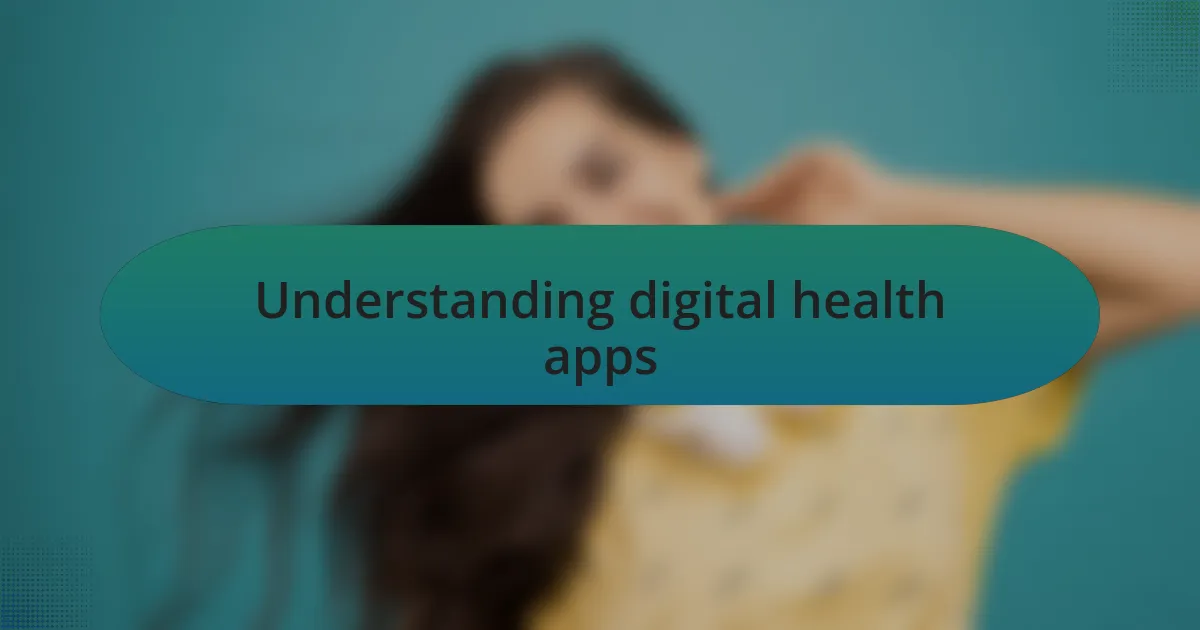
Understanding digital health apps
Digital health apps represent a fascinating intersection of technology and personal well-being. I remember my initial skepticism about downloading one to track my fitness. At first, I wondered, “Can an app really motivate me?” But as I integrated it into my daily routine, I felt a genuine change in my habits, underscoring the potential these tools have to foster healthier lifestyles.
In essence, these applications are designed not just for monitoring health metrics but also for improving user engagement. Take, for instance, a meditation app I often use; it provides personalized reminders tailored to my stress levels. This goes beyond mere functionality; it creates a nurturing environment for self-care, making personal health management feel less daunting and more reachable.
What truly sets digital health apps apart is their ability to provide real-time feedback, which can be incredibly empowering. Have you ever noticed how satisfying it is to see your progress visualized? Personally, seeing my daily step count grow has become a little victory I celebrate each day. It’s this kind of reinforcement that helps cultivate lasting health habits and highlights the transformative potential of embracing technology in our wellness journeys.
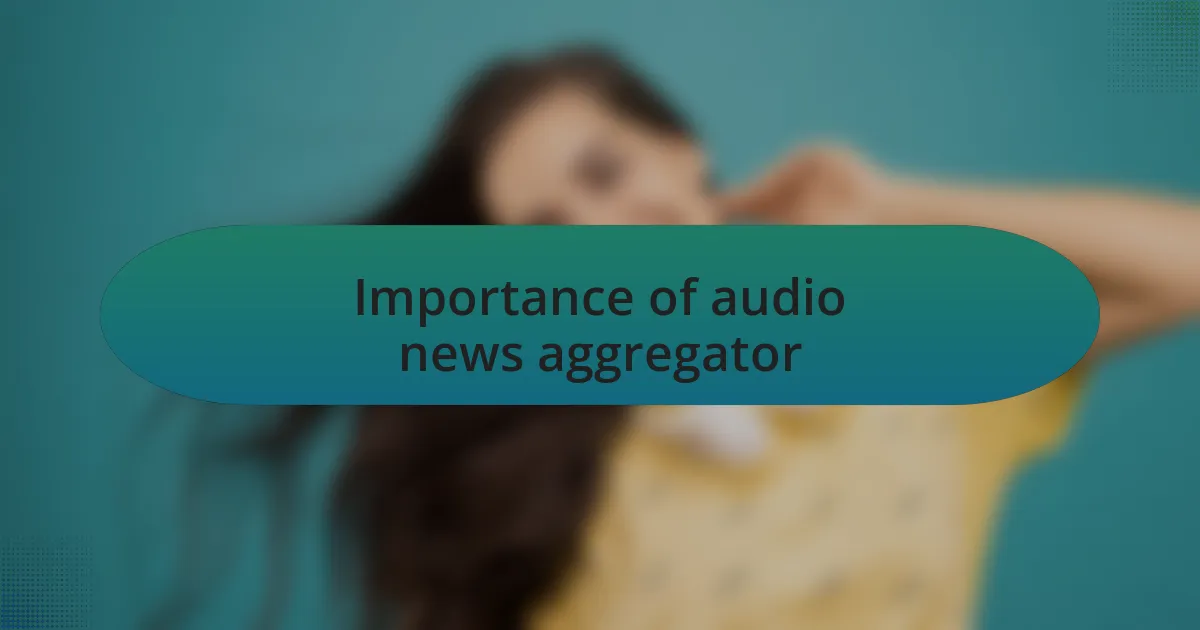
Importance of audio news aggregator
Audio news aggregators play a crucial role in today’s fast-paced information environment. I often find myself sifting through countless articles and reports, and it can be overwhelming. With an audio aggregator, I can absorb news while multitasking—be it during my morning jog or while preparing dinner. It’s fascinating how these platforms turn traditional reading into an engaging auditory experience, making it easier to stay informed.
Moreover, the convenience of audio news means I can curate my preferred sources, which resonates with my desire for personalized content. Just recently, I discovered a fantastic podcast that covers health updates, and having this delivered straight to my ears has kept me informed without feeling bogged down. Isn’t it remarkable how accessible information has become? It transforms the way we consume news, making it feel more dynamic and less like a chore.
In an age where time is of the essence, audio news aggregators provide an invaluable service. I cherish moments when I can come back from a busy day and unwind, listening to digestible snippets of news that matter to me. It’s as if I have a personal news assistant guiding me through the noise, reminding me that staying updated doesn’t have to be a burdensome task. This fusion of convenience and personalization is what makes audio news aggregators so vital to our daily lives.
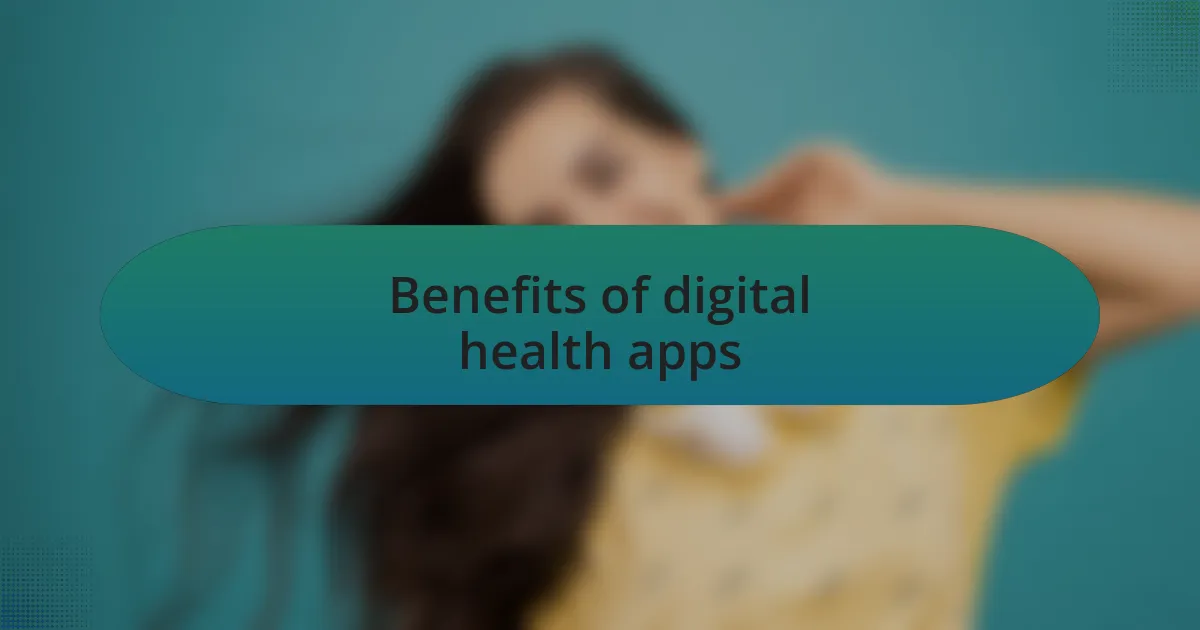
Benefits of digital health apps
Digital health apps offer an incredible opportunity for individuals to actively manage their health and wellness. I vividly remember the moment I downloaded a fitness app that tracked my physical activity. Suddenly, I was motivated to move more, as I could visually see my daily progress toward my goals. Isn’t it amazing how a simple app can transform our relationship with fitness?
What I find particularly appealing about these apps is their ability to provide personalized insights based on user data. For instance, I once used an app that analyzed my sleep patterns, revealing how certain lifestyle choices impacted my rest. Armed with this information, I made adjustments, and the improvement in my overall well-being was palpable. It’s like having a health coach available at my fingertips, guiding me toward better habits.
Additionally, digital health apps help bridge communication gaps between patients and healthcare providers. I often think about how easy it was to share my health data with my doctor during our last appointment thanks to an app. With this seamless exchange of information, I felt empowered and engaged in my health journey. Have you ever experienced the convenience of having your medical history readily available? It truly highlights the potential of technology to enhance our healthcare experiences.
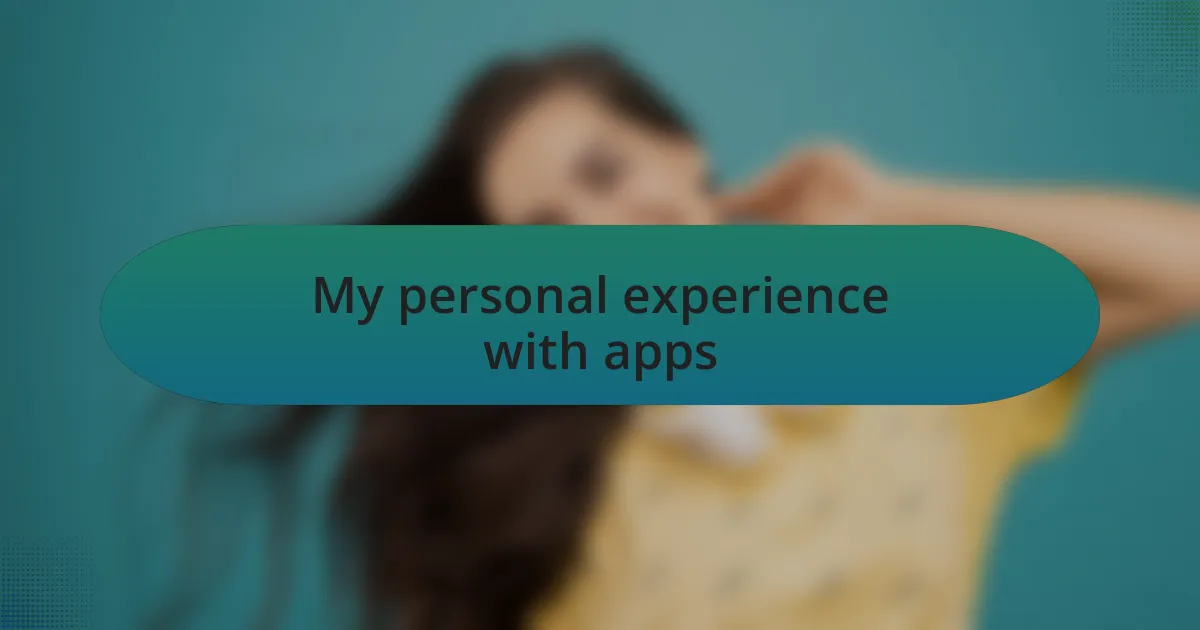
My personal experience with apps
When I first dabbled in mindfulness through a meditation app, I was skeptical. I remember sitting on my couch, headphones in, feeling a bit silly at first. But as I practiced daily, I noticed profound changes in my stress levels. Have you ever found peace in a few quiet moments absorbed in your breath? It’s astonishing how these apps can introduce you to a practice you didn’t know you needed.
One app I used had a feature that reminded me to take breaks during my workday. Initially, I brushed it off as just another notification, but it quickly became essential. Those brief moments to step away from my screen helped clear my head and boost my focus. It’s incredible how a gentle nudge from technology can pro-actively improve productivity. Did I ever think I’d rely on an app to encourage self-care? Absolutely not, but now I can’t imagine my routine without it.
In exploring these various apps, I’ve also encountered some that didn’t quite hit the mark for me. For instance, I tried a diet-tracking app that felt overwhelmingly complex. I found myself frustrated rather than encouraged, which made me question its effectiveness. Haven’t you ever felt that disconnect with a tool that should support you? That experience highlighted the importance of user-friendliness in digital health apps; they need to empower us, not complicate our lives.
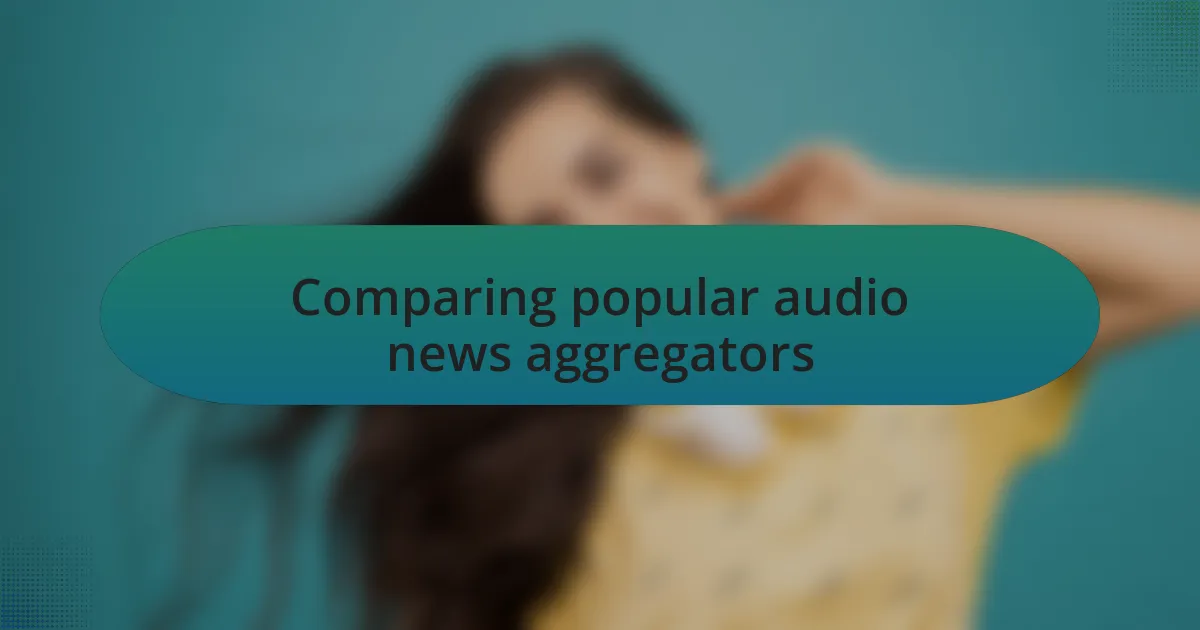
Comparing popular audio news aggregators
When it comes to audio news aggregators, I’ve noticed a distinctive variance in their offerings. For example, one service I tried, known for its extensive library, felt overwhelming at times. Have you ever sifted through a mountain of content, only to find it just doesn’t resonate with you? I learned that navigating through a wealth of information requires a balance—too much choice can lead to frustration.
In contrast, I found another aggregator that curates content based on user preferences, and it felt like a breath of fresh air. I remember listening to a daily briefing that perfectly matched my interests, making my morning routine more enjoyable. Isn’t it refreshing when technology aligns with what you truly care about? An efficient, tailored approach really made a difference in how I consumed news.
Some platforms focus on enhancing the listening experience with features like speed adjustment and personalized playlists. Personally, I was drawn to an aggregator that allowed me to control the playback speed, which often helps me digest information more effectively. Have you ever wished you could speed up getting the information without losing its essence? That feature alone transformed how I engaged with news content, offering me a more satisfying experience.
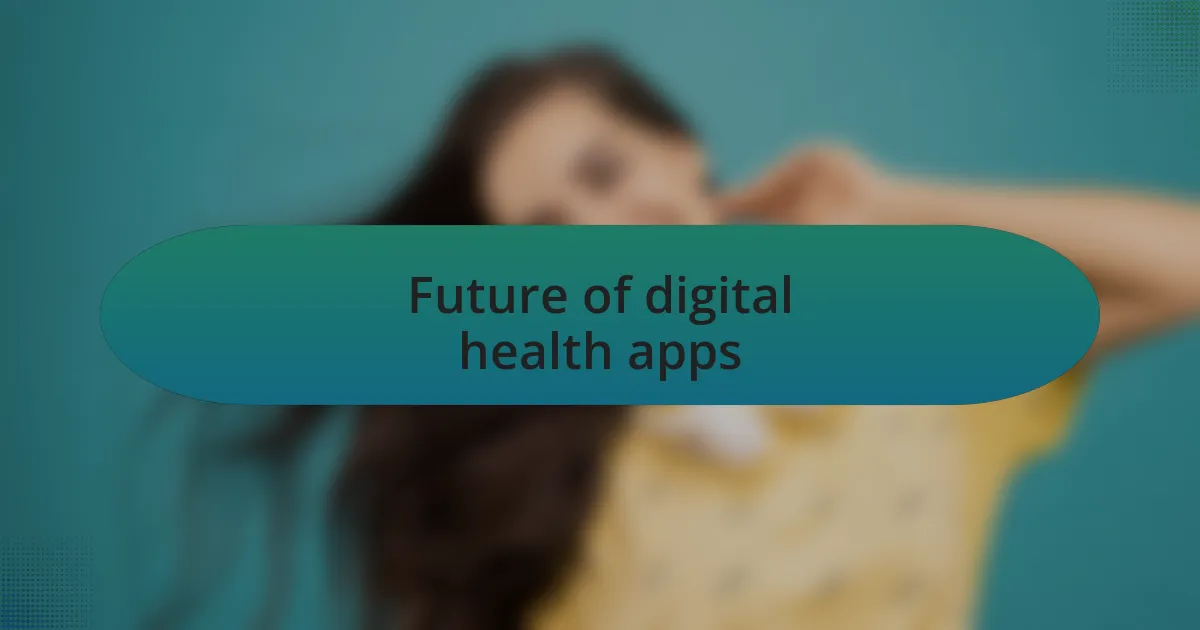
Future of digital health apps
As I look ahead, the future of digital health apps excites me. These applications are becoming increasingly sophisticated, integrating artificial intelligence to provide personalized healthcare experiences. Have you ever wondered what it would be like to have an app that not only tracks your health metrics but also offers tailored advice based on your unique data? I can only imagine the potential of predictive analytics, which could foresee health issues before they even arise.
Moreover, the rise of telemedicine within these apps promises to bridge the gap between patients and healthcare professionals. I remember a time when I had to wait weeks for a simple consultation. Now, with a few taps on my phone, I can connect with a doctor instantly. Isn’t it empowering to think that accessibility to healthcare could become a reality for everyone?
I also foresee that collaborative features, like integrating data from wearables, will revolutionize how we manage our health. I often find myself overwhelmed by the sheer amount of data available from my fitness tracker. But, if an app could seamlessly analyze this information while providing actionable insights, I would gain a clearer picture of my well-being. Wouldn’t it be amazing to transform raw data into meaningful health narratives? That’s what I envision as we move further into the age of digital health.